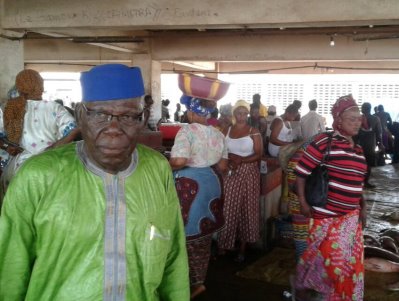 Taking advantage of his stay in Guinea for the needs of the 9th PRCM Forum, the Mundus maris delegate immersed himself in the artisanal fishing port of Boulbinet in Conakry. The objective was to make an improvised mini-report on the dynamism of this sector, its great socio-economic and cultural importance. But it was also to gather opinions from interlocutors relating to what they consider as new challenges they face due to globalisation.
Taking advantage of his stay in Guinea for the needs of the 9th PRCM Forum, the Mundus maris delegate immersed himself in the artisanal fishing port of Boulbinet in Conakry. The objective was to make an improvised mini-report on the dynamism of this sector, its great socio-economic and cultural importance. But it was also to gather opinions from interlocutors relating to what they consider as new challenges they face due to globalisation.
The interviewees were fishers and women dependent on this sector from various angles. This successful field trip would not have been possible without the assistance of Mr Faneyawa Soumah, charismatic leader and national coordinator of Guinea artisanal fishing landing docks.
1. Intensive daily activities: Illustration of the economic, social and cultural importance of the artisanal fisheries
Like the context prevailing in almost all the countries of the sub-region, Boulbinet is swarming with people twenty-four hours a day, every day. Both in the port itself and in its adjacent areas, there is intense economic activity in both the formal and informal sectors:
- Ice-making factories, a commodity that has become indispensible for fishermen forced to prolong their fishing trips;
- Small shops where fishermen can find new or second hand equipment and rigging;
- Women micro-vendors of fresh fish installed in the market built on the site;
- Points of sale of foodstuffs;
- Women specialised in fish smoking including barracuda, machoiron and flat sardinella;
- Various trades such as mechanics for outboard motors, carpenters;
- Outdoor restaurants;
- Other small businesses: hairdressers, thrift stores.
The intensity of these activities within the landing site as well as throughout its periphery easily demonstrates the importance of artisanal fisheries from the social and economic points of view. The same is true in other countries of the subregion.
2. The culinary traditions are strongly dependent on small-scale fisheries products
Beyond the predominant role of small-scale fishing in Guinea, particularly the Boulbinet landing site, which creates countless jobs in situ, this sector contributes significantly to food security. Indeed, Guinea is one of the West African countries where "eating fish" occupies an important place in the culinary traditions. Like the conditions prevailing throughout the subregion, there is a large disparity in terms of reliance on fishery products depending on whether one is in coastal, rural or forest areas. As for Conakry, a coastal city, fish has always been a dominant part of food habits.
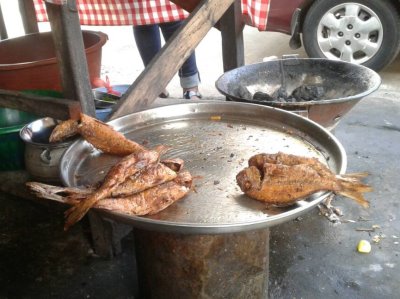 In the plate of products on offer, the "smoked fish" (sea-catfish, barracuda and small pelagics) is among the favorites. The traditional recipes allow everyone to find a dish corresponding to his or her purse: whole fish or slices sold by the piece, accompanied by local rice or Atiéké (cassava semolina). Fish is so important to some communities that it is consumed already early in the morning at 9:00 am, including smoked catfish in sauce with local rice. Given the cultural value attributed to fishery products with preferences according to ethnic groups (case of catfish for the Soussou), working for the sustainability of fishing becomes imperative as even cultural sustainability will depend on it. It goes without saying that for the fishing communities themselves, the cultural value attributed to the "fishing" activity beyond its economic dimension is not limited to strictly culinary aspects (see the interview with F. Soumah, charismatic national leader in the artisanal fisheries).
In the plate of products on offer, the "smoked fish" (sea-catfish, barracuda and small pelagics) is among the favorites. The traditional recipes allow everyone to find a dish corresponding to his or her purse: whole fish or slices sold by the piece, accompanied by local rice or Atiéké (cassava semolina). Fish is so important to some communities that it is consumed already early in the morning at 9:00 am, including smoked catfish in sauce with local rice. Given the cultural value attributed to fishery products with preferences according to ethnic groups (case of catfish for the Soussou), working for the sustainability of fishing becomes imperative as even cultural sustainability will depend on it. It goes without saying that for the fishing communities themselves, the cultural value attributed to the "fishing" activity beyond its economic dimension is not limited to strictly culinary aspects (see the interview with F. Soumah, charismatic national leader in the artisanal fisheries).
It is important to note that, in addition to restaurants specialised in these smoked products, there are other open-air restaurants in Conakry, serving freshly fried fish, accompanied mainly by Aloko (plantain bananas fried in palm oil or peanut oil) and / or Atiéké. With the extension of the city of Conakry and the problems of urban mobility pushing many workers to work without a long pause at lunch time, these types of outdoor restaurants proliferate. Finally, it is necessary to mention a striking fact regarding these places, which catches the observer's eye. They have become almost entirely dependent on "frozen fish channels" for their supply. Meeting a woman who gets fresh supplies directly from artisanal fishermen is becoming an exception to the rule.
3. Contribution to the sub-regional socio-economic integration: The little documented or simply forgotten roles of women in artisanal postharvest activities
The integration of the West African region, and more specifically the ECOWAS region, is customarily appreciated and evaluated mostly by the so-called conventional institutions working there. On the other hand, the contribution of fisher womenfolk to the development of intra-regional trade is little known or even ignored. In the case of Guinea, starting from the port of Boulbinet (still more so than Bonfi and Taminataye, areas of the Conakry conurbation), women transform large quantities of fish into "smoked products". These consist mainly of catfish, barracudas and flat sardinella, some of which is consumed locally and otherwise destined for some countries of the sub-region from the famous N'Zérékoré market. This strategically located market between Guinea and some of the neighboring states is considered as a "distribution-point" of some typically Guinean products that are very successful in the sub-region because they are labels. This is the case of the Guinean smoked catfish which has a very high commercial value, especially in Senegal.
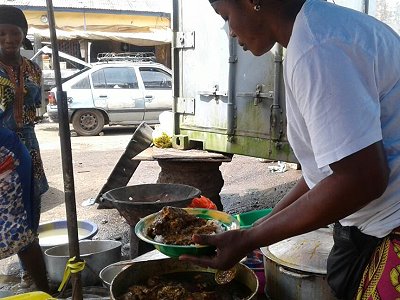 Women have traditionally dominated much of the post-capture industry. Similar to what we have documented in many localities in Senegal, we find many women not only in the processing and conditioning of fresh produce, but also in local and sub-regional trade in the Sahelian countries. As already mentioned, they are omnipresent in outdoor catering.
Women have traditionally dominated much of the post-capture industry. Similar to what we have documented in many localities in Senegal, we find many women not only in the processing and conditioning of fresh produce, but also in local and sub-regional trade in the Sahelian countries. As already mentioned, they are omnipresent in outdoor catering.
However, their negotiating power to access raw material has changed a lot in recent years as a result of changes in the ownership and organisation of work in the various sub-sectors. Thus, foreign investors with their purchasing power and impact on the work organisation have now cut off much of the direct relationship that existed between the fishers and women processors and traders. Rare are now the women who can still access the freshly landed product. Instead, they are increasingly confronted with a bulk frozen or packaged product (see description by Ms. Fofana below).
These changing conditions in Conakry have probably also played a role in the migration of many Guinean women to southern Senegal where they contribute in particular in Kafountine to the important growth of the artisanal fishery. They deal particularly in fresh fish (sardinella, rays, etc.), which they smoke and trade in the sub-region. This was documented in film on artisanal fishing in Casamance shot by Thomas Grand of Zideoprod and co-sponsored by Mundus maris. The film will soon be available for release.
4. Threats to artisanal fisheries cast doubts on their sustainability
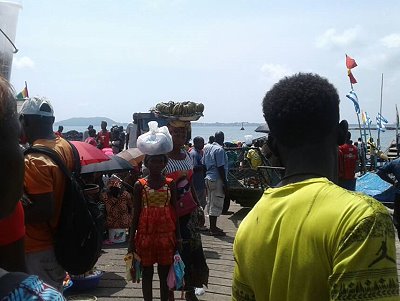 Despite the importance of small-scale fishing on the social, economic and cultural levels as we have tried to illustrate in the preceding pages, their sustainability is now in question. The interviews conducted during the multiple visits to Boulbinet with women directly involved in fishing or catering activities as well as fishers mention a combination of factors that are not likely to ensure long term
Despite the importance of small-scale fishing on the social, economic and cultural levels as we have tried to illustrate in the preceding pages, their sustainability is now in question. The interviews conducted during the multiple visits to Boulbinet with women directly involved in fishing or catering activities as well as fishers mention a combination of factors that are not likely to ensure long term
-
access to healthy resources capable of producing maximum sustainable yield for the thousands of fishers
-
sufficient domestic revenue for Guinea from the fisheries exercised in its waters, which are indispensible financial resources for the state and its citizens
-
coverage of animal protein needs of the households from fisheries products and
-
maintenance of jobs on which tens of thousands of people depend for their liveiihood.
Several problems have been pointed out by our interlocutors as being the factors seriously threatening small-scale fishing. As a direct consequence, this would lead to the deterioration of the living conditions of the tens of thousands of people who depend on the jobs in the fisheries value chain. Among these the most frequently mentioned factors revolve around the marginalisation of local women and men entrepreneurs and their perceptions about the changes taking place.
5. Globalisation and the marginalisation of local entrepreneurs, both men and women
If globalisation is about market expansion, it is a process that has begun to affect West African fisheries - including the artisanal sub-sector - for several decades. Indeed, foreign investors have been around for some time. These have always developed penetration strategies for this sub-sector taking into account local contexts, but also adapting the sub-sector to their needs. This is illustrated by some of these strategies which have already been in place (i) introduction of fishing gear through the fishmongers for the artisanal sub-sector of cephalopods by the Japanese (ii) acquisition of own production units / pirogues from exporting processing plants to avoid supply disruptions; (iii) use of the skills / abilities of fishing communities for recruiting fishers on deep-sea purse seiners and pole-and-line vessels; also oceanic fishing for yellowfin tuna in the Indian Ocean, etc.
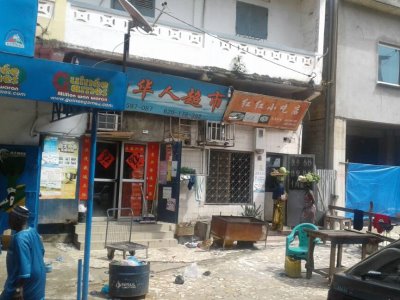 Thus, Guinea as an integral part of this ecoregion can not be spared by this phenomenon. But though globalisation is not a recent phenomenon, these promoters are in perpetual search for strategies to ensure a regular supply of products, whatever the local impact this could provoke. Indeed, the multiple visits in this site during the last five years allow to get a strong sense of the growing influence of globalisation of the markets on the artisanal fisheries and on the communities which depend on them. Among these facts, the most striking are:
Thus, Guinea as an integral part of this ecoregion can not be spared by this phenomenon. But though globalisation is not a recent phenomenon, these promoters are in perpetual search for strategies to ensure a regular supply of products, whatever the local impact this could provoke. Indeed, the multiple visits in this site during the last five years allow to get a strong sense of the growing influence of globalisation of the markets on the artisanal fisheries and on the communities which depend on them. Among these facts, the most striking are:
-
A new strategy of Korean investors consists of owning their own artisanal fishing units and recruit labour among artisanal fishers. They target Law croaker and Senegalese tonguesole for export. The catches are landed at the port of Boulbinet: croaker and tonguesole for export and the rest of accidental catches known as "African fish" marketed to women micro-fish sellers and smokers (including catfish);
-
A sub-sector set up recently called "advanced artisanal fishing" was initiated by the Chinese and is in full swing. It uses small wooden boats with inbord engines the parts of which are prefabricated in Thailand and assembled in Guinea. On board these small boats about ten artisanal fishers are recruited with a Chinese supervisor boarded to control the fishing operations. The specificity of this sub-sector is that landings are made at the Autonomous Port of Conakry where the Chinese have set up cold stores where the croaker and tonguesole are packaged for export. This makes it more difficult to ensure the traceability of products and to know the quantities taken. The rest, the "African fish", is marketed in the large urban market of Conakry called KENIE by the Chinese who use women as recruited agents. It is from this market that many women - who used to source their goods fresh from the port of Boulbinet - buy the raw material. These are housewives, caterers and processors.
-
There is another category of Chinese operators, who, contrary to the two previous groups do not own vessels, but rather concentrate on collecting fresh produce directly from artisanal fishers with the help of fish mongers. They are only interested in croaker, which they export through their circuits kept secret. There as well is a problem of product traceability.
-
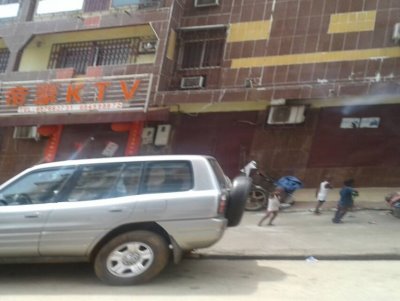 On the way to Chinatown? Beyond the physical presence of these Asians in the artisanal fishery illustrating how globalisation is a process that goes fast and far (where one did not expect it only a few years back), there is another highlight showing the influence of globalisation on the fishing communities in Guinea. This is the process of settling the Chinese in one of the most traditional neighborhoods of Conakry, Kaloum. Boulbinet is an integral part of Kaloum and a stone's throw away from the port of Boulbinet. There are now food shops, restaurants and massage areas with the appearance of brothels, all reserved exclusively for Chinese, where the attempt of the author to make a purchase has been rejected repeatedly. The most extraordinary thing is the closed nature of these places reserved for the Chinese all the while being located in the centre of this popular district.
On the way to Chinatown? Beyond the physical presence of these Asians in the artisanal fishery illustrating how globalisation is a process that goes fast and far (where one did not expect it only a few years back), there is another highlight showing the influence of globalisation on the fishing communities in Guinea. This is the process of settling the Chinese in one of the most traditional neighborhoods of Conakry, Kaloum. Boulbinet is an integral part of Kaloum and a stone's throw away from the port of Boulbinet. There are now food shops, restaurants and massage areas with the appearance of brothels, all reserved exclusively for Chinese, where the attempt of the author to make a purchase has been rejected repeatedly. The most extraordinary thing is the closed nature of these places reserved for the Chinese all the while being located in the centre of this popular district. -
Lebanese operators: just sport fishermen? Commercial artisanal fisher boat owners and / or fishmongers exporters?
If the settlements of the Asian operators described above indicate profound changes in the trajectory of Guinean artisanal fisheries, the activities of the Lebanese is another illustration of ongoing changes. Since about four to five years, we are seeing the arrival of increasing numbers of Lebanese. Their specificity lies in the fact that (i) a good number of them hold their own fishing unit and (ii) they own or control all fish shops through which they sell high value species intended mainly for export: Europe, Africa too. At the request of their customers, products can be packaged in fresh polystyrene boxes. In a short period of time, the number of these fishmongers increased in the district of Kaloum / Boulbinet. One of the rather intriguing aspects of this sector is that these operators declare themselves as "practising sport fishing" despite the commercial nature of their activities.
6. The perception of local actors, women and men
In terms of the impacts generated by the globalisation of the markets, the most concordant opinions gathered from the men and women met can be summarised in these points:
-
First, they denounce the threats posed for the marine ecosystem by Chinese and Korean practices that target exclusively croakers (more specifically) and tonguesole. According to the informants, if no effective measures are taken as a matter of urgency, they expect the stocks of croakers tol collapse from overfishing in the medium or even the short term, because already an important part of the visible landings are constituted by juveniles (small sizes). In addition, the value of the catches sometimes scarcely covers the costs of the fishing trips getting longer and longer. Longer trips force to buy more of the expensive ice and thus reduce profitability. This is a damaging downward spiral despite increased experimentation on how to reduce the amount of ice without compromising the freshness of the fish. The locals are all the more concerned about the fate of these species when they realise that this strong pressure on croakers tends to synchronize at the scale of the subregion (the same owners operating in Guinea Bissau). Also, the opacity typical of how the Asian and Lebanese investors operate poses a problem of management and governance of fisheries in view of the major constraints to inform the traceability of the products they fish and export.
-
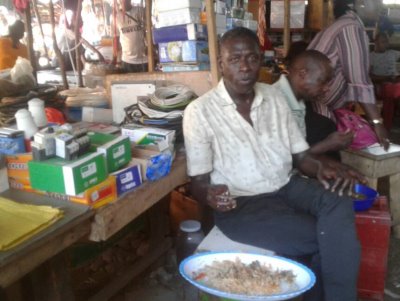 Beyond the expected negative impact of this fishing overcapacity on the resource, other direct consequences have been raised: First, for the women, the changes in the ownership structure (progressive control by Asians and Lebanese) have an impact on the social organisation as the conditions of access to products have changed. Indeed the women have fewer possibilities to purchase on credit and obtain preferential prices from fishers. In the same way, several women who obtained their supplies from fishers directly at the quai are obliged to go to the KENIE market, not far from where the Asians sell their bycatch known as "African fish". This new situation has direct negative effects on the organisation of work (more time spent buying the product in a city known for its traffic jams) and consequently higher transaction costs.
Beyond the expected negative impact of this fishing overcapacity on the resource, other direct consequences have been raised: First, for the women, the changes in the ownership structure (progressive control by Asians and Lebanese) have an impact on the social organisation as the conditions of access to products have changed. Indeed the women have fewer possibilities to purchase on credit and obtain preferential prices from fishers. In the same way, several women who obtained their supplies from fishers directly at the quai are obliged to go to the KENIE market, not far from where the Asians sell their bycatch known as "African fish". This new situation has direct negative effects on the organisation of work (more time spent buying the product in a city known for its traffic jams) and consequently higher transaction costs. -
Another worry concerns the impact of these developments on local food security. In the occasion of visiting one of the open air restaurants serving only fish with Aloko situated in a famous part of the capital called Brikomomo, Madame Fofana, manager of the place, said:
"Only seven or eight years ago, we bought fish piled up directly on the dock and we took care ourselves to put in our basins. But since then, I see only fish already packed in cardboard and most often frozen, which we must therefore thaw before cooking. Also, we do not know where it comes from, who fished it even if basically, we are rather sure that it comes from Guinean waters. My customers order smaller portions than before because the fish has become expensive. I do not understand why the chicken that we import frozen can sometimes be cheaper than the fish while we are surrounded on both sides of the ports of Boulbinet and Taminataye. I know that if the fish has become expensive, it is also because everything goes abroad and it will become a problem because people will no longer be able to eat. Look at the quantity of small mackerels and horse mackerel that I serve today and everything is bought by customers, some of whom preferred to stay on an empty stomach instead of eating these two species. Maybe there are ethnic groups who love it, but here in the restaurant it was never the dish, while now....".
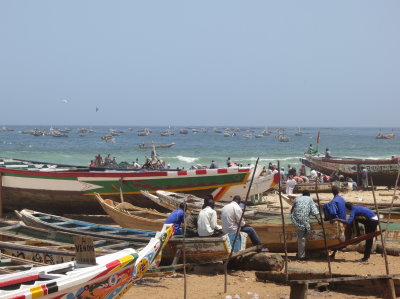 We are therefore approaching a similar situation to Nigeria where large quantities of "African fish" frozen in bulk by industrial vessels offset the scarcity of fish in the country's waters in the face of strong demand. With the difference that the Guinean waters and all those of its neighbours to the north of Africa were among the richest in the world. But IUU fishing is causing widespread overfishing. Thus species with high international market value whose populations are already greatly reduced are accessible only by the rich - whether at home or abroad. The small pelagics often caught in Senegal and Mauritania - fortunately of good nutritional value - are still within the reach of the populations as long as they are not reduced to fishmeal and fish oil to feed salmon and other carnivorous species fattened in fish cages eg in Norway - or China for that matter.
We are therefore approaching a similar situation to Nigeria where large quantities of "African fish" frozen in bulk by industrial vessels offset the scarcity of fish in the country's waters in the face of strong demand. With the difference that the Guinean waters and all those of its neighbours to the north of Africa were among the richest in the world. But IUU fishing is causing widespread overfishing. Thus species with high international market value whose populations are already greatly reduced are accessible only by the rich - whether at home or abroad. The small pelagics often caught in Senegal and Mauritania - fortunately of good nutritional value - are still within the reach of the populations as long as they are not reduced to fishmeal and fish oil to feed salmon and other carnivorous species fattened in fish cages eg in Norway - or China for that matter.
This is an additional argument for proponents of a development choice that should be given to artisanal fisheries. This assessment highlights that as locally anchored economic value chains, small-scale fishing distributes costs and benefits relatively better than industrial fishing. This is in opposition to an approach associated with a sort of myth that fisheries development should go towards complete industrialisation (all phases of the value chain, from capture to marketing). This was prevalent in Senegal, where, since independence in 1960, the authorities had based all their hopes on the industrialisation of small-scale fishing deemed "doomed to its own demise". But this assertion has not withstood the analysis of the facts when we see today the place of small-scale fishing in the overall economy of capture fisheries (ex: not less than 65% of the volumes exported by the factories come from artisanal fisheries). J.P. Chevaux, in one of his works, referring to the dynamism of this artisanal fishery, spoke of "development without developers".
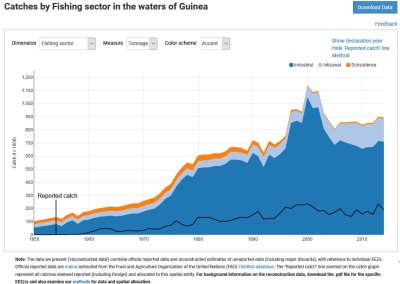 Conversely, IUU fishing (illegal, unregistered, unregulated) as it is practised in particular by industrial vessels flying different flags, which are responsible for half of the catches in the sub-region and more than three quarters in Guinea, compromises the resource to such an extent that the local and sub-regional economy based on artisanal fishing risks of breaking down. The significant decrease of catch per unit of effort in these small-scale fisheries are pointing in that direction. (1, 2, 3).
Conversely, IUU fishing (illegal, unregistered, unregulated) as it is practised in particular by industrial vessels flying different flags, which are responsible for half of the catches in the sub-region and more than three quarters in Guinea, compromises the resource to such an extent that the local and sub-regional economy based on artisanal fishing risks of breaking down. The significant decrease of catch per unit of effort in these small-scale fisheries are pointing in that direction. (1, 2, 3).
In a West African context where the authorities are still looking for financial means to support decentralisation, the artisanal fisheries, from the perspectives it offers from what we have seen in the port of Boulbinet, could be a good source of inspiration provided that it is protected from unfair competition from industrialists. In fact, compared to the industrial fishing port located not far away, Boulbinet, like all artisanal fishing ports, has the following advantages: (i) opened up to the public thus offering opportunities to carry out income-generating activities for thousands of people with no other alternative (ii) the "atomised distribution" providing prospects for widely distributed local development compared to industrial ports located in one and only one site given the investment in hard infrastructure needed and where the benefits accree only to few owners and investors.
(1) Belhabib, D., Doumbouya, A., Diallo, I., Traore, S., Camara, Y., Copeland, D., Gorez, B., Harper, S., Zeller, D. and Pauly, D. (2013). Guinean fisheries, past, present and... future?. pp 91-104. In: Belhabib, D., Zeller, D., Harper, S. and Pauly, D. (eds.), Marine fisheries catches in West Africa, 1950-2010, part I. Fisheries Centre Research Reports, 20(3). Fisheries Centre, University of British Columbia, Canada [ISSN 1198-6727] and graph with catches between 1950 and 2012 according to different search criteria.
(2) Belhabib D, Sumaila UR, Lam VWY, Zeller D, Le Billon P, Abou Kane E, et al. (2015). Euros vs. Yuan: Comparing European and Chinese Fishing Access in West Africa. PLoS ONE, 10(3): e0118351. https://doi.org/10.1371/journal.pone.0118351
(3) Belhabib D, Sumaila UR and Pauly D (2015). Feeding the poor: Contribution of West African fisheries to employment and food security. Ocean & Coastal Management, 111:72-81. https://doi.org/10.1016/j.ocecoaman.2015.04.010
7. Then, were are we with our ambitions for sustainable fisheries?
The fisheries administration of the Republic of Guinea, in its efforts to sustainably manage its resources has put in place a number of measures. These are in the context of its public policy, but also in the framework of the various agreements maintained with third countries and other actors of sustainable development (Sub-Regional Fisheries Commission (SRFC), the Regional Partnership for the Conservation of the Coastal and Marine Zones in West Africa (PRCM), the West Africa Regional Program of the World Bank (PRAO), etc.).
But like in other countries in the subregion, there is the question of their implementation. Indeed, as demonstrated by a country-by-country analysis of the effectiveness of Monitoring, Control and Surveillance (MCS) to counteract industrial IUU fishing, the annual economic losses are dramatic for countries needing to invest for their overall development and protect their resources for sustainable use (4).
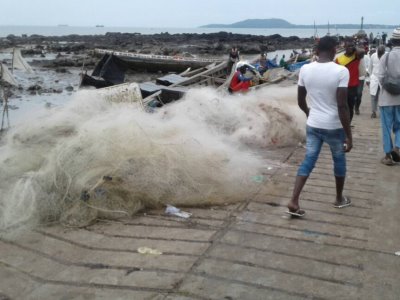 Meanwhile, the monofilament nets are prohibited for artisanal fishing, but cheap and easy to procure. The use of this harmful gear tends to become widespread as can be seen at port level. This gear, as evidenced by some old fishermen and some women involved in the fish trade and smoking, causes significant damage by degrading marine ecosystems through its poor selectivity and environmental pollution resulting from major losses of nets. The quantities of juveniles landed by these nets and subject to post-harvest losses are increasing compared with the years before (see interview with Mr. Soumah). According to this charismatic leader, beyond the environmental damage caused by this gear, the fishing communities must have interest in reducing their impact, particularly the catch of juveniles, in order to continue to be able to rely on marine ecosystems for a living.
Meanwhile, the monofilament nets are prohibited for artisanal fishing, but cheap and easy to procure. The use of this harmful gear tends to become widespread as can be seen at port level. This gear, as evidenced by some old fishermen and some women involved in the fish trade and smoking, causes significant damage by degrading marine ecosystems through its poor selectivity and environmental pollution resulting from major losses of nets. The quantities of juveniles landed by these nets and subject to post-harvest losses are increasing compared with the years before (see interview with Mr. Soumah). According to this charismatic leader, beyond the environmental damage caused by this gear, the fishing communities must have interest in reducing their impact, particularly the catch of juveniles, in order to continue to be able to rely on marine ecosystems for a living.
Why is there a kind of status quo between the fisheries administration and the actors in the fisheries sector? We have found different answers.
The effective capacity for maritime surveillance and administrative and judicial prosecution of shipowners and industrial crews whose convictions are confirmed is not easy to develop and maintain. Especially since the administrations in place seem not yet well prepared to cope with major economic interests and very varied criminal methods as presented recently at a conference in the European Parliament on international organised crime associated with the fishing industry.
The increase in the number of domestic artisanal fishers, plus migrants from several nationalities in the subregion who tend to settle down, constitutes a contribution to the country's economy, but at the same time poses a problem for the sustainability of resources in the region. This becomes a problem to the extent to which massive IUU fishing adds to the catch of artisanal fisheries and competes with them directly. Monitoring and control is not yet as strict as it should be for the sector as a whole, including small-scale fisheries.
Moving the problems from the national context (level of each state) to the sub-regional level is not the only solution to consider. It is true that "A problem of regional dimension, needs a regional solution", but this way of reducing everything to a sub-regional approach is sometimes a real obstacle to any search for a solution, because it can distract from a measure already feasible and necessary at the local and national level. The example of fishers' organisations was often cited to illustrate these reservations with regard to a sub-regional approach in all directions. According to some of our interlocutors, the transfer of prerogatives from traditional leaders (at the community level) to a category of modern-day new leaders speaking on behalf of a whole sub-region without being well anchored among the people they are supposed to represent is a problem. A. Camara, a fisher in Boulbinet, speaking to us, said: "You know Sir, today NGOs listen and talk to people who are not listened to by the community because they are not delegated by our communities. What do you want?". It is imperative to take into account the areas of traditional power that continue to prove themselves at the local level (community scale).
 The fishermen, having recognised that they have their share of responsibility in the current state of resource crisis and that it would be of great interest to their communities to bring the situation again under control, cited some factors that did not favour the reversal of this trend, such as:
The fishermen, having recognised that they have their share of responsibility in the current state of resource crisis and that it would be of great interest to their communities to bring the situation again under control, cited some factors that did not favour the reversal of this trend, such as:
-
The difficulty that some fisher leaders have - aware of the situation and ready to move - to convince their followers to change while industrial fishing vessels have free hands to do what they want. With more transparency in industrial fishing practices and better enforcement, this could help to make things happen on the artisanal fisheries side as well.
-
The market represents the power of money and as long as the demand for fish increases in rich countries, the pressure will continue on our resources. As our administrations (in poor countries) do not have enough resources (human resources, strong institutions, investment and governance capacity) this is hard to resist. Also, the bargaining power and the required coercive force of the administration are still lacking against the shipowners.
-
It is time to strengthen the competencies of the responsible administration so that they can fulfil their mandate and become more successful in reducing or even stamping out IUU fishing.
-
There may also be a role for fish consumers, especially in rich and emerging countries. Awareness-raising actions about the effects of their appetite on our ecosystems and low-income populations that have only fish as a source of animal protein could help slow the growth of demand. Serious labels identifying low-impact sustainable fishing could help in raising consumer awareness.
Returning to Senegal, the head still turns after having faced so many changes since the last visit. At the same time, the problems identified are not fundamentally different from those encountered in Senegal. In the important artisanal landing places one finds more and more fishermen who have their main base in another village or country, but who come for a campaign or settle themselves. The idea of an artisanal fisheries academy as a forum for exchange and joint research to deepen understanding of the issues and explore desirable and feasible exit routes seems more timely than ever, even necessary.
Text and photos are by Aliou Sall (unless indicated otherwise).
(4) Doumbouya A, Camara OT, Mamie J, Intchama JF, Jarra A, Ceesay S, Guèye A, Ndiaye D, Beibou E, Padilla A and Belhabib D (2017). Assessing the Effectiveness of Monitoring Control and Surveillance of Illegal Fishing: The Case of West Africa. Front. Mar. Sci., 4:50. doi: 10.3389/fmars.2017.00050
The fisheries country profile of Guinea produced by the Sub-Regional Fisheries Commission can be accessed here, while catches since 1950 reconstructed by independent research can be accessed here.








